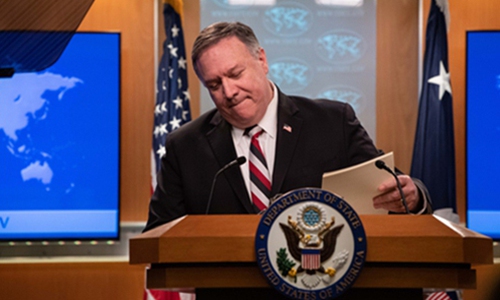Pompeo will not have his way in coercing Europe to pick sides: Global Times editorial
Source:Global Times Published: 2020/6/20 20:23:40

US Secretary of State Mike Pompeo Photo: AFP
US Secretary of State Mike Pompeo viciously attacked China at the virtual 2020 Copenhagen Democracy Summit on Friday, forcing and inducing European countries to choose between Beijing and Washington. "The choice isn't between the United States; it's between freedom and tyranny," he said, accusing the Communist Party of China of being a "rogue actor."
It's hard to imagine that US politicians like Pompeo are that fearful of China's rise and so hysterical in containing China. They are well aware that maintaining US hegemony via smearing and suppressing China has violated the bottom line of international relations in the 21st century and it's difficult to reestablish an anti-China alliance like what the US did against the Soviet Union during the Cold War. Pompeo's Friday speech demonstrated his petulance for not being able to promote things according to his wishes.
There are differences on values and political systems between China and Europe. But is China as evil as Pompeo portrayed it to be? His accusations do not match the facts.
Europeans do have some preconceptions about China. Does that mean they can't get along with China? How dreadful would the world become if countries can only interact with others that share the same values?
Who is China and what does China mean for Europe, Europeans have their own judgments. How could China possibly threaten Europe? Has China ever asked Europe to give up on NATO or make the choice between China and the US? It is Pompeo who has made such demands clear.
Europeans know clearly where their pressure comes from, the US or China, when making their strategic plans. When Germany and Russia are trying to build the Nord Stream 2 pipeline, which country hindered the project? When European countries decide on which device to use for the development of their 5G networks, which country exerted more pressure? Beijing or Washington?
In terms of how close Europe can interact with the US, China never intervenes. But on the issue of Europe-China ties, the US is increasingly not regarding itself as an outsider. European countries have felt increasingly more coercion coming from the US in recent years.
Pompeo's speech in Copenhagen was not intended to be a candid discussion with European countries, but rather a dressing down of its European allies and demanding them to toe Washington's line. No doubt European countries are closer to the US than to China, but the question now is Washington asking Europe to choose sides, and ready to throw away European interests like apple peels. This is asking too much from Europe. Washington will find such a goal difficult to attain.
Washington will eventually find that as it tries harder to isolate China, it will actually isolate itself further in many cases. How it describes China is more like describing itself.
The US is coercing the world, requesting the world like how it told the Taiwan authorities and Australia to do. This is bound to fail even if the US is powerful because it is asking countries to treat American interests as their own.
The US is rallying and coercing allies to confront China. This reminds us of the importance to develop mutually beneficial cooperation with most countries, including US allies to break the US' tricks. The deteriorating China-US relations mean we need to make adjustment according to different priorities.
Posted in: EDITORIAL